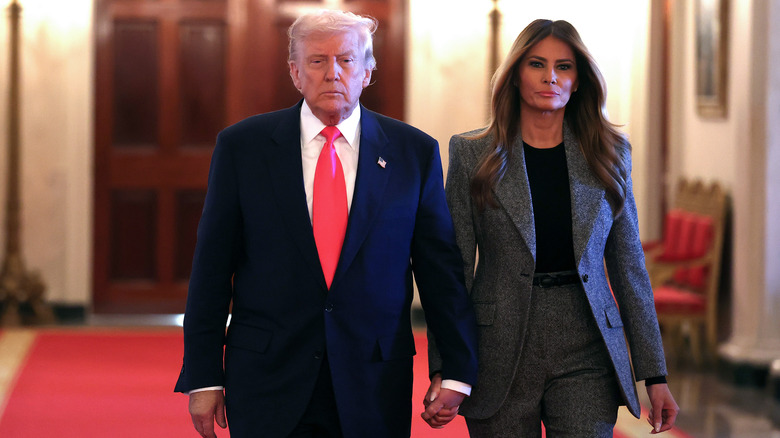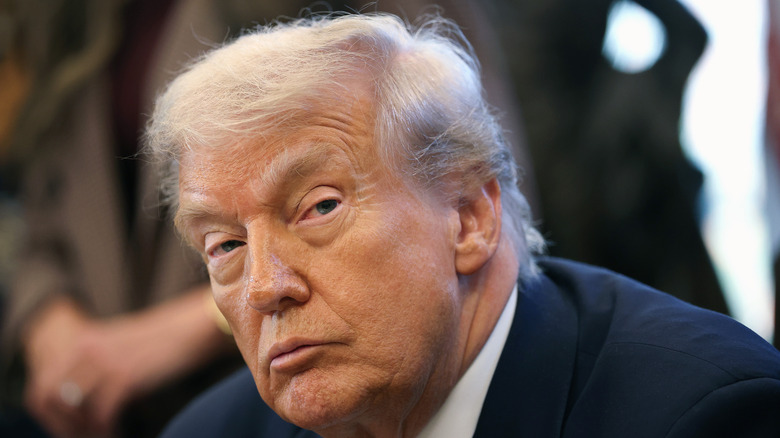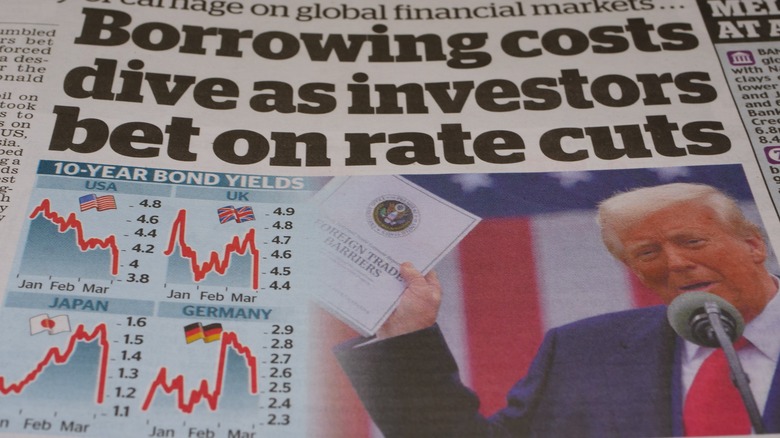Trump's Surprise 'Shopping Spree' Sparks New Questions
As of September 2025, Forbes pegs President Donald Trump's net worth at $7.3 billion. That fortune includes $2 billion in cryptocurrency and another $2 billion in Truth Social, a social media platform that the president uses to announce new trade policies that often have an unexpected effect on the stock market. The same report also says Trump's net worth increased by $3 billion within the past year.
So, what does a wealthy president do with all that money? Trump apparently doesn't have an expensive Birkin bag collection like his wife, Melania, but he has been collecting bonds. According to Reuters, Trump invested anywhere from $82 million to $337 million in corporate and municipal bonds from August 28 through October 2, 2025. The 175-plus transactions were released by the U.S. Office of Government Ethics per the 1978 Ethics in Government Act but don't disclose the exact amounts for each purchase.
The bulk of those bonds are related to public entities such as cities, states, counties, and school districts. Yet Trump acquired corporate bonds as well, including in sectors that have benefited from or stand to benefit from recent deregulations and other actions by the Trump administration. Needless to say, many are asking questions about the ethicality of such investments.
Trump bought bonds issued by Meta Platforms, Home Depot, and more
As reported by Reuters, the disclosure shows Donald Trump bought bonds for Facebook parent company Meta Platforms, retailer Home Depot, CVS Health, banking giant JP Morgan, and investment conglomerates Goldman Sachs and Morgan Stanley. According to Bloomberg, Trump also bought bonds for Netflix, UnitedHealth Group, and Boeing.
The president also acquired bonds in semiconductor chipmakers Broadcom, Qualcomm, and Intel. Trump's acquisition of Intel was made after his administration paid $8.9 billion for a 9.9% stake in the company in August 2025. Less than a month later, chipmaker Nvidia made a huge money move by investing $5 billion in Intel to build more data centers, AI infrastructure, and other computing products.
In an earlier filing reported by Bloomberg, Donald Trump revealed that he had invested at least $103.7 million in 690 bond transactions from the time he was sworn into his second term of office in January 2025 to early August 2025. Those purchases included bonds for local governments, school boards, airports, and gas districts. CNBC reported that they also consisted of corporate bonds worth between $500,000 and $1 million each that were issued by United Health, Home Depot, and T-Mobile, as well as bonds priced between $250,000 and $500,000 for Meta.
How bonds work — and why people are asking questions about Trump's
Bonds are different from stocks in that they are basically loans to government entities and companies. These bonds can be held until maturity, during which the bondholder gets their invested money back plus the agreed-upon interest, or they can sell them on the open market, where prices can swing up or down. Lower interest rates also tend to make bond prices go up. Notably, Trump and his allies have been pressuring the Federal Reserve to cut rates, and the president has even threatened to fire its chairman, Jerome Powell, for his earlier reluctance to do so.
Besides encouraging the acquisition of a piece of Intel, as mentioned, President Trump has issued executive orders reducing regulations related to developing more AI infrastructure and data centers. His administration has also cut regulations on financial companies and is trying to cut off Federal Reserve funding for the Consumer Financial Protection Bureau, a financial protection agency that may run out of cash in 2026.
Presidents aren't required to divest assets that may be a conflict of interest. With that said, past presidential officers have done so since 1978, with Trump being the first to defy that tradition. The White House has previously declared that decisions on Trump's investment portfolio are made by a third-party financial entity.


